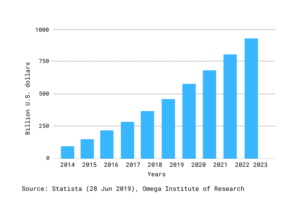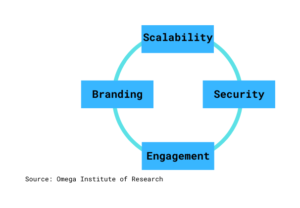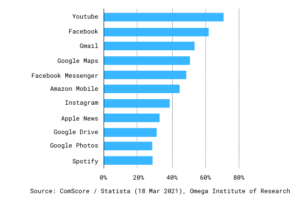- Industries
Industries
- Functions
Functions
- Insights
Insights
- Careers
Careers
- About Us
- Information Technology
- By Omega Team

A mobile application (or mobile app) is a program designed to be run on a mobile device, including a smartphone or tablet, to perform specific tasks.
We have become used to accessing web pages through a desktop since internet usage began to rise. However, the portability of the internet has been a key factor in the popularization of mobile phones in the current decade. As a result, people tend to spend more time on apps than the web pages on their mobile phones.
The development of mobile applications started in 1997 when Nokia released in its Nokia 6110 a built-in version of the basic arcade game “Snake”. Many consider this invention one of the first mobile applications, but it became more established in 1983 when Steve Jobs envisioned a very basic version of the App Store, where software could be acquired over a phone. Now we can find many options such as Google Play, the Amazon App Store, and Blackberry’s App World, all with the same purpose of promoting app distribution.
Figure 1: Worldwide Mobile App Revenue, 2014-2023

Mobile applications belong to an industry that is growing such as the education, entertainment, and eCommerce industries. In only four years (starting from 2014), there was an increase of 273.8 percent in revenue for mobile applications, and it is expected that in 2023 there will be a revenue of 935.2 billion U.S. dollars around the world.
The allure of Mobile Applications
The biggest advantages of mobile apps are their ease of use, accessibility, and personalization. Even if apps are usually small software units with limited function, they still manage to provide users with quality services and experiences. First, they are accessible with just a touch – they load faster than websites, and you can even access many of them without connecting to the network.
Mobile apps are convenient tools because they adjust to the settings you already have on your phone. For example, suppose you don’t have perfect vision (or you just prefer to display text in a bigger size), your phone can integrate the text size you already configured into your mobile app. Convenience is one of the reasons why they are popular in every age range. In the U.S., 96 percent of the people from ages 18-29 own a smartphone while in people of 61+, it lays on 61 percent of the population. Overall, the share of Americans that own a smartphone is now 85 percent, compared to 35 percent in 2011. Moreover, with mobile applications, you can store your information and do not have to log in every time you want to use a service. For example, you may have your healthcare account registered in an application, which is useful in many situations: you can access a virtual representation of your insurance policy or you can find your nearest providers for any medicine that you may be taking. The Health app on the iPhone keeps track of how many steps you have per day and it connects with other apps that are specially developed for health tracking.
Suppose you use an app that measures your sleep or your calories when you workout that would be reported on the Health App. On the other hand, they can take advantage of utilities in your phone such as your geolocation for whenever you want to get to your destination quickly and you can set up handy notifications.
Benefits of Mobile Apps for Business
An app promotes direct communication with clients because it provides a space where information is gathered from customers. This information can be used to improve the service that your business offers, which ultimately will build a stronger brand, provide more value to your customers, and achieve their loyalty. Customers want to be heard. They want you to be accessible when they have a question or a complaint. The quicker a customer can communicate their concerns and receive a response, the less likely they are to leave a bad review. Well-designed mobile apps are the fastest way to provide customers the response they expect.
Mobile apps also serve as a useful marketing channel for all kinds of businesses. With notifications, information that may be useful for clients, such as deals or rewards, can be sent in an instant. Using the data collected from an app is a great way to understand your target audience and improve your brand marketing strategy. Also, social sharing is encouraged with the use of social media buttons to motivate your app users to share their experiences with your brand and spread awareness.
Pillars of Mobile App Development for Businesses
Apps can give you more control over your business. There are several areas where you can make the best of the extensive control:
Branding: Your app design is a crucial element in achieving the desired effect. From log to effects of animations, your mobile app is a great way to adapt your brand strategy as your business grows.
Security: Security is the foundation of successfully doing business online. With a custom mobile app, you can add as many specialized security features as you deem necessary.
Scalability: As the business expands, mobile apps allow you to add more power to the mix. This may depend on how much you invest in technology development.
Engagement: Mobile apps are also great for building and improving long-term customer relationships. You can nurture these relationships by consistently sending personalized updates about your products and services.
Figure 2: What You Can Control Through Mobile Apps

Trends in Mobile App Technology
Figure 3: Mobile Audience Reach of Leading Smartphone Apps in the United States as of February 2011

Within the mobile application world there exists an ocean of divisions and categories that can be analyzed. From the figure above, we can indicate that the leading smartphone applications up to February 2021 are (in the top 3): YouTube (71 percent), Facebook (62 percent), and Gmail (54 percent). They all provide the function of communication, while YouTube and Facebook further focus on entertainment and function as social media. An app that lets us communicate with one another and be updated with what’s happening around us is attractive to the public. Apps such as Facebook Messenger, Instagram, and Apple News accomplish this function. The utility apps developed by Google, including Google Maps, Google Drive, and Google Photos are popular as well.
Strategies & Tools
Instagram is a worldwide known application that launched in October of 2010, and it has improved and adapted so well to the trends that keep emerging in society. It first started with the idea of interacting only through pictures. It promoted the concept of hashtags and filters that we now use on many platforms.
The reason Instagram remains in the market as an excellent product is because the developers have been implementing new popular functions on it over time. Currently, Instagram has many features of popular apps that have appeared. A direct message system that merges with Facebook Messenger and lets us network and socialize. The introduction of videos was well-liked, and the so-called IGTV certainly resembles a YouTube within the app. Even before, with the introduction of Instagram Stories, they were able to weaken its social media competitor Snapchat. Now with Instagram Reels, they are trying to do the same with TikTok. You can also shop within the app, and most importantly, you can access all the media you have posted in the past and relive some of your memories.
Instagram is an excellent example to follow. With its 1.074 billion users worldwide in 2021, it shows that being able to adapt effectively to the demands of the market really pays off.
Conclusion
In general, efficiency, overall appearance, versatility, ease of use, and adaptability are the main elements that make a mobile app engaging to its users. Initially, the most basic value an app has is how well it can accomplish the main tasks. Based on the fundamental functions, if it is well designed and nice-looking,it would captivate the public’s attention. Moreover, making the app useful for a variety of purposes such as entertaining, storing user information, communicating, and helping users investigate and learn about their surroundings are excellent baits for users.
If you own a business and want to expand your brand and reach your customers, mobile applications are an ideal tool. For any industry, an app can serve as a platform to engage and create a relationship with your clients. It is one of the fastest ways to connect you to the public. It enables you to gather the information and consequently, utilize the data it collects to improve your services to target their demands directly.
However, it is very important to not let the implementation of your mobile application become too complex with its multiple functions. Otherwise, it could throw away accessibility or user-friendliness. An ideal mobile application should be easy to use and understand, as well as it should continuously adapt and keep up with the trends of the market and the needs of targeted users.
Subscribe
Select topics and stay current with our latest insights
- Functions